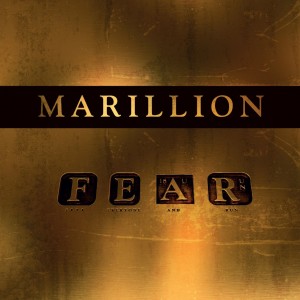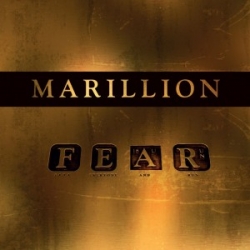English art rock quintet Marillion is a remarkable yet atypical band. Formed in 1979, the group’s initial four studio LPs (and thus, first decade) were championed by many as the solution to Genesis’ drastic turn towards ‘80s commercial pop dominance (which, to be fair, is a reductive assessment). Of course, this was due in large part to the timbre and theatrics of lead singer Fish, who left in 1989 and was replaced by the gentler and smoother Steve Hogarth. Since then, the line-up has stayed the same (vocalist Hogarth, bassist Pete Trewavas, guitarist Steve Rothery, keyboardist Mark Kelly, and drummer Ian Mosley). If that isn’t commendably enough, this new era has remained incredibly consistent, relevant, and passionate as well, with many fans declaring their 17th effort, 2012’s Sounds That Can’t Be Made, their best work yet.
That is, until the release of their newest opus, F E A R (a cautionary abbreviation for Fuck Everything and Run). Broken into six pieces (three of which are lengthy suites), it’s already received staggering praise not only as Marillion’s crowning achievement, but as the best album of 2016, too, and for good reason. Overflowing with trademarks like delicate emotion, authoritative social commentary, and vibrant structural variety, it’s both a superficially engaging listen and a multilayered and necessary critique on the modern world. Like all great records, it takes a few listens to fully digest, but once you do, you’ll be overtaken by its power.
In the press release, Hogarth explains the full-length’s title, concepts, and music as follows:
All worthwhile human impulses come from love. And all negative and destructive human impulses come from fear. . . . This title is adopted not in anger or with any intention to shock. It is adopted and sung . . . tenderly, in sadness and resignation inspired by an England, and a world, which increasingly functions on an ‘Every man for himself’ philosophy. I won’t bore you with examples, [as] they’re all over the newspapers every day. There’s a sense of foreboding that permeates much of this record. I have a feeling that we’re approaching some kind of sea-change in the world—an irreversible political, financial, humanitarian and environmental storm. I hope that I’m wrong. I hope that my FEAR of what ‘seems’ to be approaching is just that, and not FEAR of what ‘is’ actually about to happen.
These sentiments bleed through F E A R from beginning to end. Opening five-part set “El Dorado” placates listeners with its preliminary mixture of soft acoustic guitar arpeggios, birdsong, and pensive vocals, evoking Kate Bush’s equally epic “A Sky of Honey” (from Aerial). It soon turns more symphonic and sinister, though, before transitioning into your typically bombastic yet haunting Marillion rocker. In contrast, its third and fourth sections, “Demolished Lives” and “F E A R,” respectively, are colder and sparser, utilizing the same sort of ominous bass lines and industrial ambience that made Fates Warning’s A Pleasant Shade of Gray so poetic and chilling. It’s also during this fourth movement that Hogarth issues some of the record’s most heated vocals and lyrics, such as: “And the madmen all say they hear voices / God tells them what to do / The wars are all about money / They always were / And the money's dressed up in religion / And when it's not showing off, the money's hiding.” Afterward, the final chapter acts as a tranquil yet tragic reflection, blending more acoustic guitar notes with piano chords and droning synths. All in all, “El Dorado” is a masterpiece onto itself.
Surprisingly, the two subsequent suites, “The Leavers” and “The New Kings,” are even better. The former packs a greater sense of diversity, wisdom, and intrigue overall, with each segment taking you on a different path. For instance, “Wake Up in Music” is grounded by hypnotic and heartfelt loops, whereas both “The Remainers" and “One Tonight,” while significantly different in certain ways, are luscious ballads brimming with touching tones and introspective melodies. As for “The New Kings,” it’s a staggering achievement, plain and simple. Be it the sorrowful strings moving around Hogarth’s outcries during “Fuck Everyone and Run,” the choral blankets of “Russia’s Locked Doors,” or the outright mournful momentum of “A Scary Sky,” every second of it coated with beauty and loss. Nowhere is this more apparent than during its closing ode, “Why is Nothing Ever True?”. Distorted guitar chords, horns, feisty rhythms, and distressed piano riffs provide a wonderful foundation on which Hogarth lays his antagonistic but defeated laments, including “Remember a time when you thought that you mattered / Believed in the school song, die for your country / A country that cared for you / All in it together? / If it ever was more than a lie or some naive romantic notion / Well, it's all shattered now It's all shattered now.” In a way, it’s like Marillion is combining the English majesty of Big Big Train with the heated politics of Pink Floyd’s The Wall. You can’t help but be moved to tears and action as a result.
Naturally, each epic is followed by a shorter piece (sequentially, they’re “Living in F E A R," "White Paper," and "Tomorrow's New Country"), and all three do a great job of filling in the cracks. “Living in F E A R” essentially packs the tender build-up and eventual empowerment of “Essence” (from Happiness is the Road), whereas “White Paper” is another ballad highlighted by persistently punchy percussion and especially forceful singing. Fortunately, “Tomorrow’s New Country” acts as an effective coda to the preceding sequence; like “Eldorado: I. Long-Shadowed Sun,” it’s a brief passage, yet it replaces the opener’s hopeful cadence and warmth with bittersweet singing (including female harmonies) and subjugated piano chords and guitar lines. It’s a subtle but piercing finale.
As any fan should expect, F E A R is more than just a collection of pleasing tracks; it’s a work of art whose poetically disillusioned lyricism, graceful yet robust and sometimes frenzied instrumentation, and majorly fragile vocals culminate in emotionally charged elegance akin to almost anything in Gazpacho’s catalog. Although its themes may be chillingly dystopic and relevant, the fact that a band that’s been around this long can create something this meaningful and stunning is downright life-affirming. Whether or not it outdoes all of its predecessors and/or current competition is entirely subjective (obviously), but there’s no denying how much of an achievement it is. As with everything else Marillion does, F E A R will certainly help you find a better way of life.


